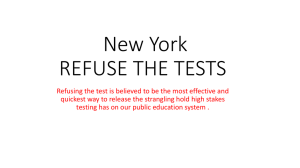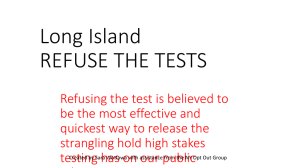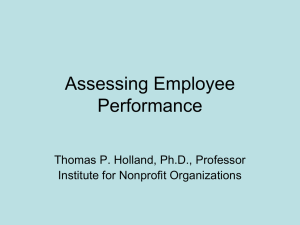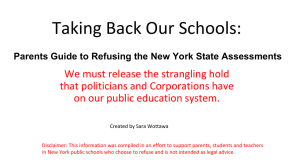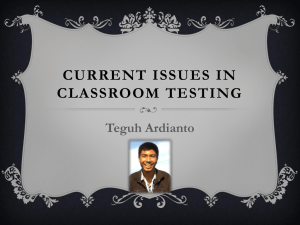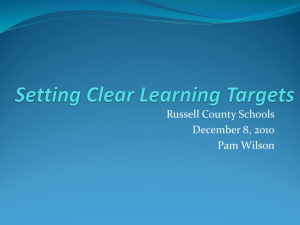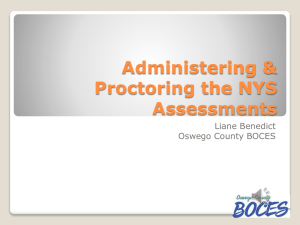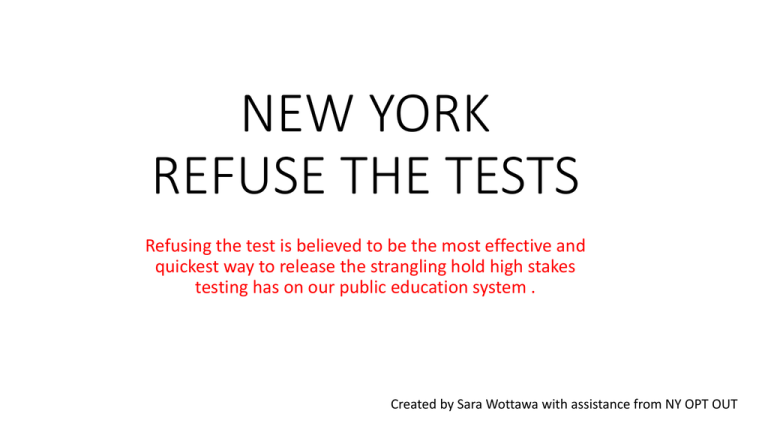
NEW YORK
REFUSE THE TESTS
Refusing the test is believed to be the most effective and
quickest way to release the strangling hold high stakes
testing has on our public education system .
Created by Sara Wottawa with assistance from NY OPT OUT
•
•
•
•
•
•
•
•
•
•
•
•
•
•
•
Testing Is Damaging
Why Parents are Opting Out
What You Need to Know About Opt Out / Refusing the NYS Exams
Frequently Asked Questions About Opt Out / Refusing
Academic Intervention Services (AIS)
Frequently Asked Questions about AIS
Refusing State Assessments and Accountability
Sample Refusal/Opt Out Letter
Sample Response to District Denial Letter
Sample Board of Education Letter
United States Code, 2011 Edition Title 20 - EDUCATION
Parent’s Rights
Sample Letter to Elected Officials
Elected Officials Contact Information
Informative Links
Reasons Why Standardized Testing is Damaging
1. Standardized Testing takes away approximately 25% of our children's academic school year.
2. Standardized Testing gives teachers incentives and forces teachers to "teach to the test" instead of nurturing higher
order thinking skills.
3. Standardized Testing teaches children that there is only one right answer in academics and in life.
4. Standardized Testing costs millions of dollars of taxpayer money to produce and thousands of dollars of our school
district's money to implement.
5. Standardized Testing encourages our best teachers to seek other careers where their expertise is valued.
6. Standardized Testing is developmentally destructive for specific age groups.
7. Standardized Testing is creating corruption among schools where school districts are cheating on test scoring.
8. Standardized Testing is creating corruption among students where students are purposely scoring poorly to negatively
affect teachers that they don’t like.
9. Standardized Testing gives teachers incentive to care more about their teacher evaluation than they do about children
10. Standardized Testing uses our children as tools to evaluate school districts, schools, and teachers. Students do not even
get a chance to learn from their mistakes. In fact, they never see the test after they take it.
Some of the reasons why parents are having their child refuse to participate in standardized
testing this year:
“Last fall I heard about SLO tests, and when I started learning about them I thought it was the dumbest solution to accountability ever. Then I asked a few
questions and learned that the State tests are also used to evaluate teachers and schools. Then I did a little math, added up how tests are administered and said
"this has to stop". I was in the dark, blind to the whole mess, which is why it is so important for us to just educate parents about the problem.”
Eric L. Mihelbergel Parent of a 2nd and 5th grader
“ I have always felt like standardized tests were flawed, but as a parent of a 5 year old I am particularly concerned about the amount of testing we are forcing on
our young children. Research shows that testing young children is highly unreliable and most specialists in the field of early childhood education do not condone
the practice. We have opted-out of all forms of assessment that aren't for the sole use of the classroom teacher, who I feel is the most skilled to be able to judge
my son's progress. We aren't facing high-stakes tests this year, but we are committed to boycotting them in the future as well. People often wonder why we are so
worried already. We don't want our children's education dominated by meaningless assessments, and we want them to grow up with a sense of normalcy when it
comes to questioning the value of these tests and saying 'no thank you!‘” Danielle Boudet Parent of a preschooler
“Standardized testing is a inaccurate way to measure learning and determine success in any content area. The new state mandates especially the common core
state standards are depriving my children of a meaningful education and deterring them away from developing a love for learning. The amount of testing and
assessments forced upon children is excessive and that excessive amount of testing is being used by NYSED to determine if a teacher is effective or not. I can't
stay silent and do nothing while these unjustly abusive mandates and policies are setting up our children and our schools for failure. I'm not okay with
corporations and politicians taking advantage of students and teachers.” Sara Wottawa Parent of a Kindergarten and 2nd grader
“ I've seen firsthand my child go from loving learning to being worried, anxious and stressed about these tests. These tests...which have no real bearing on her
future...these tests...which take up months of test prep time instead of teaching time...these tests...which are making corporations VERY rich and children very
stressed...these tests...which are being used to grade teachers who got into teaching to make a difference, not make children miserable.”
Parent of a 1st and 4th grader
“We simply feel our children are spending way more time testing with no benefit to them. We want them to spend more time learning over testing, practice tests,
and all the other assessments they endure. They've lost all time associated with projects and hands on learning.” Ricki Braun Marin Parent of a 3rd and 5th grader
What You Need to Know About Opting Out / Refusing NYS Assessments
A child can refuse any NYS assessment by pushing away their exam. Your child should prepare a note
stating, “I refuse all state tests” and bring it to school on each day tests are administered. They should not
be given a makeup exam. Make-ups are only for students who are absent according to the School
Administrator’s Manual p.25. If you keep your child home for the days of the test, they will be given a
makeup exam any time during the testing window and the specified testing makeup days. View the NYS
testing schedule for specific dates. If a child refuses to take the exam, they will not receive a grade or score
of zero. Their exam will be coded “999” which is the code for “refusal.” They will be considered to have "no
valid test score".
NYS Assessments are NOT used to determine services for special education. Special education students
WILL NOT lose services if they refuse NYS assessments.
Refusing to take a NYS exam may impact your child’s access to accelerated programs. However, no one
measure should account for a child’s access to an instructional program and this is something that can and
should be discussed further with your child’s school district.
Frequently Asked Questions About Opt Out / Refusing
Q. What is the difference between "refusing" and "opting-out"?
A. There is no provision for opting-out of NYS assessments but Students can refuse to take NYS assessments. The difference between opting
out and refusing is the language and students have to refuse rather than their parents opting them out. However, parents can write and
submit a refusal letter to their school district on behalf of their child. Many parents have successfully submitted refusal letters. Many
districts have accepted parents refusal letters. It has been recommended that you send your child in with a note the day of testing that
states, “I refuse all NYS Assessments.”
Q. Should my child write "refuse" on the test?
A. No your child should not write anything on the test. Most districts have pre-printed labels on the test so the child does not have to
write their name on it. Most districts, principals, and teachers seem to agree that If anything is written on the test it could be scored as
"zero" instead of "999". The consensus seems to be that the child should just push the test away and write nothing, but double check with
your principal.
Q. Is my child allowed to read once they refuse the test?
A. You must discuss this with your individual school. Schools are not required to allow your child to read once they have refused the test.
Some schools are allowing children to read once they refuse the test, and other schools are willing to even provide another room or
activity for them. It is best to keep a friendly, open communication with the principal and work with him/her to create an acceptable
environment for your child. If all else fails, you reserve the right to remove the child from the test once they have refused. You should try
to work with the school first.
Q. Will refusing NYS assessments prevent promotion to the next grade?
A. No. Students cannot be held back if they refuse state tests (except for Regents exams).
Academic Intervention Services (AIS)
Districts must adopt or approve a written procedure for identifying students for academic intervention services in those grades K-12
where there are no State assessments in English language arts or mathematics and in those grades 4-12 where there are no State
assessments in social studies or science. This procedure shall apply across the district to all schools and students at the same grade level.
Districts should assure that multiple assessments/sources of evidence are used and that criteria are in place that determine the
identification of performance on those measures/sources of evidence that would place a student at risk of not meeting State learning
standards and in need of academic intervention services; and Performance that indicates that a student is meeting, or is likely to meet,
State learning standards and no longer in need of academic intervention services.
The multiple assessments/sources of evidence should measure student accomplishment of core curricula for the elementary, middle, and
high school levels in those standards areas requiring AIS.
Such assessments are not limited to, but may include:
Developmentally-appropriate measures such as: Diagnostic assessments, early reading assessments/literacy profiles, assessment
portfolios performances/demonstrations; and/or assessments of content skills, concepts, and knowledge.
Tests of demonstrated technical quality such as: Standardized, norm-referenced tests (above grade three), standardized, criterionreferenced tests; other commercially-prepared assessments; and/or other measures that meet the standards contained in Standards
for Educational and psychological Testing (American Psychological Association).
Sources of evidence are not limited to, but may include review of classroom performance ( i.e., participation, student
work/portfolios, homework completion) report card grades; and/or student records.
Recommendations from teachers, administrators, counselors, other school staff, and parents. Districts may also adopt or approve the
procedure in grades where there are State assessments, particularly to assist in determining the level of intensity needed for services.
For AIS Source Click Here
Frequently Asked Questions About AIS
Q. How does a district determine which students are eligible for academic intervention services?
A. Students who score below the designated performance levels on elementary, intermediate, and commencement-level State assessments
in English language arts, mathematics, social studies, and science. Students at risk of not meeting State standards as indicated through
the district-adopted or district approved procedure, including those K-3 students who lack reading readiness.
Q. If a student does not have a state assessment score or is absent for part or all of a state assessment how should a school district
determine eligibility for AIS?
A. If a student is absent for all or part of a State assessment, no score is provided to the district. In such cases where a student has no State
assessment score, the district should, as soon as possible, follow the district-adopted or district-approved procedure for identifying
students at risk of not meeting State learning standards.
Q. What is a district’s responsibility if a parent objects to having his/her child receive academic intervention services?
A. The district should, in a timely manner, listen to parental concerns, share evidence of the student’s need for academic intervention
services, and work with the parent(s) to assure the provision of appropriate academic intervention services. Placement in educational
programs during the regular school day, however, remains the responsibility of the district and school.
Q. Do parent(s) have the right to advocate for their child to receive academic intervention services or to make changes in academic
intervention services already being provided for their child?
A. Yes. Parent(s) may advocate for their child to receive academic intervention services. The district should, in a timely manner, listen to
parental concerns and review the student’s school record and assessment results to determine if the child meets eligibility criteria for AIS.
Parents also have right to request changes in the program of academic intervention services being provided to their child. District and
school staff should work with parent(s) to determine the possible necessity for changes based on additional information; and review
scheduling and delivery options that might better meet the student’s needs. However, the district retains the responsibility for appropriate
placement of the student.
Source
Refusing State Assessments and Accountability
NYS was granted a waiver from the United States Department of Education in May 2012, so that NY has flexibility with implementing the federal law
“No Child Left Behind”. In exchange, NY agreed to set higher standards, provide a rigorous curriculum aligned with the “Common Core” standards, and
look at student growth and graduation rates in addition to test scores as a way to measure school performance.
New York was required to identify all schools as either “Priority Schools”, “Focus Schools”* or schools “in good standing”. Most schools on Long Island
are “in good standing”. The designation of “in good standing” CAN’T BE CHANGED until the 2015-16 school year – regardless of test scores and student
participation.
This has been a big issue for some parents – if your school is in good standing and doesn’t make AYP for 3 consecutive years, the school is still NOT
identified in any negative way during those 3 years! They still continue to be “in good standing”. NO plan has to be put in place, NO funding is affected
at all. The school simply reports their progress to the state, as they’ve always done.
Schools that are “Priority” or “Focus” schools have to implement an improvement plan and/or whole school reform. For more information view the
Engage NY memo.
If your school is “in good standing”, your school has “immunity” from making “Adequate Yearly Progress” (AYP) until the 2015-16 school year IT
DOESN’T MATTER HOW MANY KIDS TAKE OR DO NOT TAKE THE ASSESSMENT TESTS! There is NO consequence for less than 95% participation on state
tests, or for low scores.
Sample Test Refusal Letter
Dear Administrator,
Thank you for all that you do for our school.
I am writing to respectfully inform you that my child, (name), under my guardianship and advice, will be scored as a “refusal”, with a
final score of “999” and a standard achieved code of 96, on all State testing including ELA, Math and Science as described in the NYS
Student Information Repository System (SIRS) Manual on page 63. Please note that a “refusal” is not the same as “absent” as they are
defined differently and scored with different standard achieved codes on page 63 of the SIRS Manual. Also note that on page 25 of the
2013 Edition School Administrator’s Manual it is explained that “The makeup dates are to be used for administering makeup tests to
students who were ‘ABSENT’ during the designated administration dates.” My child will specifically be scored as a “refusal”, not
“absent”, and therefore my child will continue to receive a free and appropriate public education in his/her regular classroom
environment during the administration of all makeup test periods as this letter provides written verification of a “refusal” for all tests.
I would ask that the school please provide an alternative activity for my child during administrative sessions of testing (not makeup
tests, as my child will be in his/her regular classroom environment during makeup tests). However, I understand that an alternative
activity is not required on the part of the school. If you are unable to provide an alternative activity for my child I would ask that you
please utilize the provision of the NYS Testing Program Educator Guide to the 2013 Common Core which, on page 9, explains “When
Students Have Completed Their Tests….that student may be permitted to read silently.” I am reserving the option of removing my child
from school during the test administration session depending on the emotional anxiety state of my child on the day of refusal and
whether or not the school will provide an alternate activity for my child.
Thank you very much. I look forward to a great end of the school year.
Sincerely,
Dear (name of administrator)
We are writing today to formally inform the district of our decision to refuse to allow our child (name) , to participate in any standardized assessments
imposed on children across the state for remainder of the 2012-2013 school year. Our refusal should in no way reflect on the teachers, administration, or school
board. This was not an easy decision for us, but we feel that we have no other choice. We simply see these tests as harmful, expensive, and a waste of time and
valuable resources.
This year we will show effort to eliminate unnecessary and harmful assessments in our public schools. Our child will not participate in any assessments
other than those solely for the use of the individual classroom teacher. We refuse to allow any data to be used for purposes other than the individual teacher’s
own formative or cumulative assessment. Any assessment whose data is used to determine school ranking, teacher effectiveness, state or federal longitudinal
studies or any other purpose other than for the individual classroom teacher’s own use to improve his or her instruction will not be presented to our child. To be
clear, our children will not participate in the following:
Any state assessment
Any so-called “benchmark” exams whether they are teacher-designed or not, since these exams are imposed by entities other than the individual teacher.
Pre –assessments connected to “Student Learning Objectives”.
Any surveys, or “field tests” given by corporate or government entities or testing companies.
Any progress- monitoring or RTI assessments such as Aimsweb
Any exam used to formulate an evaluation or score for our children’s teachers or their school.
We will be encouraging other parents to stand up against the testing fad and, more importantly, the corporate and government takeover of our schools.
We believe in and trust our highly qualified and dedicated teachers and administrators. We believe in the high quality of teaching and learning that occur in
our child’s school. We hope our efforts will be understood in the context in which they are intended: to support the quality of instruction promoted by the
school, and to advocate for what is best for all children. Our schools will not suffer when these tests are finally gone, they will flourish.
(Name of School District) should have a unified policy in place to address children who are refusing these assessments.
We do apologize in advance for the inconvenience or scrutiny that this decision may cause the administration, the school, and staff.
Sincerely,
(your name)
ATTACH COPY OF REFFUSAL PROCEDURE
Sample response letter for when the denies your refusal/opt out request
You will receive a response to your opt out letter from your district that states that there is no provision in statue of
regulation allowing parents to opt their children out of tests in New York State Assessments. PARENTS HAVE THE
CONSTITUTIONAL RIGHT TO OPT OUT THEIR CHILDREN!
Dear ( Superintendent’s name)
I am well aware there is no provision in statue of regulation allowing parents to opt their children out of tests in New
York State. However, federal law states that parents possess the “fundamental right” to “direct the upbringing and
education of their children.” Furthermore, the Court declared that “the child is not the mere creature of the State:
those who nurture him and direct his destiny have the right coupled with the high duty to recognize and prepare him
for additional obligations.” In recognition of both the right and responsibility of parents to control their children’s
education, the Court has stated, “It is cardinal with us that the custody, care and nurture of the child reside first in the
parents, whose primary function and freedom include preparation for the obligations the State can neither supply nor
hinder.” Just to be clear, (name of school district) does not have permission to administer any state or district mandated
standardized benchmark assessments to my children Enter children's full name.
Sincerely,
(your name)
Attach Copy Of The United States Code Chapter 48 Department of Education Subchapter I - GENERAL PROVISIONS
Sample Board of Education Letter
Good evening. Thank you for everything that you do for our children in the district. We all work hard to do what is best for the students.
My name is __________. I have (number of Children) that attend ( name of school).
I know ________ is an excellent school district, and I am happy that my children are able to go to here. However, with all of the recent changes in education, I am worried
for them and their education.
NYS standardized testing has become excessive and extraordinarily harmful to students, teachers, and our schools in general. It has changed the culture and climate of
schools for the worse.
I believe in our students, teachers, administrators, and in you.
I believe in standards. I believe in assessments. I believe strongly in public education.
I do NOT believe that private companies, like Pearson, have the best interest of our children, our future leaders, in mind.
I do NOT believe in high-stakes standardized testing.
And, most importantly, I DO believe that the current implementation of high-stakes standardized testing will bankrupt and destroy public education.
High-stakes testing already pollutes our classrooms. There are test prep, SLOs, and Common Core Content Standards that are not developmentally appropriate, and set our
children up to feel like failures from the start.
High stakes testing is also expensive. It is a tremendous financial burden which will bankrupt the public school system.
When I consider the effects of testing on our budget, I have three questions for you:
1) What are the direct and indirect costs of standardized testing?
2) What percentage of our budget is that?
3) The PARCC standardized testing is approaching which is a computerized test requiring additional technology to administer. What more will be cut as we allocate our
funds to technology to meet that mandate?
As our resources are directed towards these mandates, they are taken away from the arts and other non-mandated elements of our curriculum which negatively impacts
our students’ ability to be truly college and career ready- or more simply said- their ability to be happy, healthy, and wise.
I believe that we are at a crucial point in public education. I do NOT believe that we can hunker down, do our best, and wait for these “tough times” to pass.
If we do not take a stand now, we may not have anything to stand for at all. Public education as we know it could disappear in the near future leaving us with a hierarchy
of charter schools ranging from the “have-it-alls” to “never-had-a-chance”.
Here is my request. Other school boards across NYS have written resolutions on high stakes testing. I ask that you, too, stand up for our students and our community in
this way. I have copies for you of a national resolution on high stakes testing. I urge you to review the information.
I would like to again thank you for everything that you do on a volunteer basis on behalf of our community and our students. I admire your courage to stand for what is
right and look forward to your action in fighting the privatization and profiteering of public schools.
Thank you.
20 U.S.C.
United States Code, 2011 Edition
Title 20 - EDUCATION
CHAPTER 48 - DEPARTMENT OF EDUCATION
SUBCHAPTER I - GENERAL PROVISIONS
From the U.S. Government Printing Office, www.gpo.gov
SUBCHAPTER I—GENERAL PROVISIONS
§3401. Congressional findings
The Congress finds that—
(1) education is fundamental to the development of individual citizens and the progress of the Nation;
(2) there is a continuing need to ensure equal access for all Americans to educational opportunities of a high quality, and such educational opportunities
should not be denied because of race, creed, color, national origin, or sex;
(3) parents have the primary responsibility for the education of their children, and States, localities, and private institutions have the primary responsibility
for supporting that parental role;
(4) in our Federal system, the primary public responsibility for education is reserved respectively to the States and the local school systems and other
instrumentalities of the States;
(5) the American people benefit from a diversity of educational settings, including public and private schools, libraries, museums and other institutions, the
workplace, the community, and the home;
(6) the importance of education is increasing as new technologies and alternative approaches to traditional education are considered, as society becomes
more complex, and as equal opportunities in education and employment are promoted;
(7) there is a need for improvement in the management and coordination of Federal education programs to support more effectively State, local, and private
institutions, students, and parents in carrying out their educational responsibilities;
(8) the dispersion of education programs across a large number of Federal agencies has led to fragmented, duplicative, and often inconsistent Federal policies
relating to education;
(9) Presidential and public consideration of issues relating to Federal education programs is hindered by the present organizational position of education
programs in the executive branch of the Government; and
(10) there is no single, full-time, Federal education official directly accountable to the President, the Congress, and the people.
(Pub. L. 96–88, title I, §101, Oct. 17, 1979, 93 Stat. 669.)
Parental Rights
Federal law
Parents' federal constitutional rights: The Supreme Court has repeatedly held that parents posses the
“fundamental right” to “direct the upbringing and education of their children.” Furthermore, the Court
declared that “the child is not the mere creature of the State: those who nurture him and direct his destiny
have the right coupled with the high duty to recognize and prepare him for additional obligations.” (Pierce
v. Society of Sisters, 268 U.S. 510, 534-35) The Supreme Court criticized a state legislature for trying to
interfere “with the power of parents to control the education of their own.” (Meyer v. Nebraska, 262 U.S.
390, 402.) In Meyer, the Supreme Court held that the right of parents to raise their children free from
unreasonable state interferences is one of the unwritten "liberties" protected by the Due Process Clause of
the Fourteenth Amendment. (262 U.S. 399).
In recognition of both the right and responsibility of parents to control their children’s education, the
Court has stated, “It is cardinal with us that the custody, care and nurture of the child reside first in the
parents, whose primary function and freedom include preparation for the obligations the State can neither
supply nor hinder.” (Prince v. Massachusetts, 321 U.S. 158)
Dear (Politicians Name)
I'm writing today as a concerned parent of two children who attend public school in Suffolk County New York. Education “Reform” policies such as Annual Professional Performance Review (APPR) and the
Common Core State Standards (CCSS) and the excessive amount of assessments that come with the standards are negatively effecting my children and their learning environment.
Having a child in kindergarten and a child in second grade I have knowledge of how much rigor children at such a young age are forced to endure. The CCSS are depriving my children of a meaningful
education and deterring them away from developing a love for learning.
The Common Core State Standards are designed for the common students where does that leave the student who is uncommon? By uncommon I mean the student who it may take a while to learn and
grasp the concepts of what is being taught, the student who has emotional difficulty adjusting and the student who is disadvantaged and worried if he/she will have dinner on the table that evening. We live
in a society filled with uncommon people. What defines the Common student? What traits does that common student hold? We live in a nation where the common is not so common and teaching to
standards that are geared toward the common student is setting our kids up for failure.
APPR is not just a concern for teachers. It is a great concern for parents and children in school as I see some of the negative consequences of the current APPR system affecting the learning environment at
my child's school, and I hear similar stories from parents across the state. As a parent, I am very uncomfortable about my child's performance on a test being used to judge his teacher. Focusing on testing
takes time away from a variety of valuable classroom experiences. It does nothing to foster deep and meaningful learning. Test preparation and testing itself consume a large amount of time that could
otherwise be used for a more comprehensive education.
APPR forces teachers against their will to “teach to a test” that only measures a small percentage of what really matters and what I want my children to learn. This greatly narrows curriculum and as
previously stated, and fosters superficial learning. All of the test preparation and tests themselves will suffocate love of learning rather than allow teachers the time to nurture and develop it by using
creative means and collaboration with other teachers. Not only are children losing their passion for learning, stress and anxiety are greatly increased by testing. Kids I know are coming home with stomachand headaches and telling their parents how scared they are of doing poorly on the test, or how they fear they are going to disappoint their teacher. No child deserves this burden!
A Met Life study shows that, “Principal and teacher satisfaction is declining. Principals’ satisfaction with their jobs in the public schools has decreased nine percentage points since it was last measured in
2008. In that same period, teacher satisfaction has dropped precipitously by 23 percentage points, including a five-point decrease in the last year, to the lowest level it has been in the survey in 25 years. A
majority of teachers report that they feel under great stress at least several days a week, a significant increase from 1985 when this was last measured.”
The results of this study are simply put, SAD! And, I notice it in the schools. I have talked with many teachers across Long Island, and the profession they once loved has become a prison sentence. Teachers
aren't given the respect their profession deserves. It's hard to even call it a profession anymore. If this trend continues, I am afraid that the best teachers will leave the profession as it has become so
degrading. I want the best teachers for my children! Teaching is becoming and unwanted profession and the meager salary does nothing to attract new talent to the field. Finally, the cost of all of this testing
adds up to millions of dollars each year for our state. This money could be used for so many more valuable forms of education and much needed resources and technology, especially for the schools that are
already known to be struggling.
I’m reaching out to you in hopes that you can foster a resolution against these policies that are harming our public education system and setting our children up for failure and deterring them from
developing a love for learning.
Sincerely,
Let’s start engaging our Federal representatives as well as our state leadership.
Letter writers, get your typin’ fingers ready! Here are the ways to contact your
representatives and Senators: Contact your representative.
Regardless of where you live in NY, be sure to send a copy of your letter to Timothy Bishop and
Carolyn McCarthy, who sit on the Education and Workforce Committee.
http://www.house.gov/representatives/#state_ny
Contact your Senator. Or both.
http://www.senate.gov/general/contact_information/senators_cfm.cfm?State=NY
Contact the Education Committee Members in the NYS Assembly:
http://assembly.state.ny.us/comm/?sec=mem&id=12
Contact NYS Education Committee Members in the NYS Senate:
http://www.nysenate.gov/committee/education
Thanks Kris Nielsen For This Info
Click on the links below for more information and see how others are standing up and
fighting back to save our public education system from crumbling.
NY Stop Testing
New York Principals Letter
United Opt Out New York
National Center for Fair & Open Testing
Children of the Core
The Plain Satisfactions
Change the Stakes
Network for Public Education
Time Out From Excessive High Stakes Testing
At the Chalk Face
Western New Yorkers for Public Education
Opt Out central New York
Join a Facebook Group or Follow a Facebook Page
Opt Out New York Group
Greater Rochester Opt Out
Long Island Opt Out Info
Ken-Ton Parents Against Excessive Standardized Testing
Parents Kids Against Standardized Testing
Letters and Experiences of Parents who chose to Opt Out Group
Rethinking Testing Mid-Hudson Region
Pencils DOWN Rockland County
Long Island Parents & Teachers Against Standardized Testing & APPR

